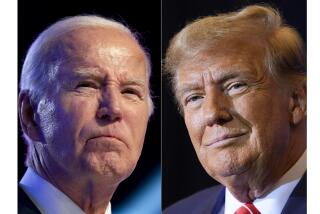Stakes Are High for Clinton in N.H. Vote : Election: Polls show the onetime front-runner now trails Tsongas. Defeat in Tuesday’s primary could ultimately wreck the governor’s campaign.
- Share via
MANCHESTER, N.H. — Arkansas Gov. Bill Clinton, who not long ago seemed to be coasting toward victory in the New Hampshire primary, is now in serious trouble. As a result the stakes for him in Tuesday’s vote are higher than ever.
“Winning would be an extraordinary personal vindication,” said Clinton pollster Stan Greenberg, because it could be interpreted as voters repudiating rumors and allegations about Clinton’s character and fidelity.
But defeat, many politicians and analysts now believe, could set in motion forces that could ultimately wreck Clinton’s candidacy. Should he finish second or lower on Tuesday, the allegations about his personal life will have called into question his trump card over his Democratic rivals--electability--and possibly opened the door to new candidates entering the race.
The immediate threat to Clinton is from former Massachusetts Sen. Paul E. Tsongas, who appears to have pulled ahead of the Arkansas governor in the polls.
“Basically, he (Tsongas) has caught him,” said Tsongas pollster Irwin Harrison after four days of private soundings that concluded Sunday night.
“Gov. Clinton’s movement has been stymied by the two personal issues surrounding his candidacy,” said state party Chairman Chris Spirou, a neutral in the competition. “And Tsongas has been the main beneficiary.”
In late January Clinton faced unsubstantiated charges in a supermarket tabloid that he was unfaithful to his wife, and last week a Wall Street Journal article questioned whether he had sought to manipulate his draft status to avoid service in the Vietnam War. Clinton has denied the allegations.
“People are already saying . . . that he can’t be elected, and they’ll be saying that more often if he loses in New Hampshire,” says Mark Siegel, a well-connected Washington political consultant and former executive director of the Democratic National Committee who is also uncommitted in the current campaign.
“If he (Clinton) comes in second, third or fourth, a lot of people will be inclined to write off his candidacy, even though he can look ahead to the primaries in the South, his political base,” said Illinois party Chairman Gary LaPaille. “I think what will happen then is that there will be a call for some of the heavyweights to get in the race.”
This is because many party leaders would question whether Tsongas has a forceful enough personality and broad enough appeal to be a credible general election candidate.
Among those likely to be sought after, LaPaille said, are New York Gov. Mario M. Cuomo and House Majority Leader Richard A. Gephardt, both of whom previously took themselves out the 1992 race.
Of course a victory here could restore Clinton to front-runner status and would leave him in a strong strategic position to take advantage of the flock of delegates to be won in the primaries in his native South on March 10. And while it would not totally erase the new doubts about his electability, it would certainly make it much harder for any well-known Democrats to enter the race.
Publicly, Clinton’s advisers contend that even a second place finish here would be a respectable result. They liken Tsongas’ candidacy in this state to that of former Massachusetts Gov. Michael S. Dukakis, who owed his victory in the 1988 New Hampshire primary in large part to the advantages of having his political base right next door.
“If Dukakis won here last time with 37% of the vote, what would be so surprising if Tsongas won this time with about 30% of the vote?” asked Paul Begala, a Clinton campaign consultant.
But party leaders say that rationale is not as persuasive as it might have been if Clinton earlier had not vaulted to the forefront of polls assessing the Democratic race.
“If he goes from front-runner to second place, that means something has taken him down,” said Ohio party Chairman Eugene Branstool. “And that looks like a loss in voter confidence.”
More to Read
Get the L.A. Times Politics newsletter
Deeply reported insights into legislation, politics and policy from Sacramento, Washington and beyond. In your inbox twice per week.
You may occasionally receive promotional content from the Los Angeles Times.










